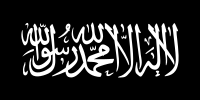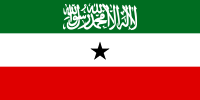Shahada
| Part of a series on |
| Islam |
|---|
 |
The Shahada (Arabic: الشهادة Template:ArabDIN , from the verb [] Error: {{Lang}}: no text (help) Template:ArabDIN "to testify") is the Islamic creed. The Shahada is the Muslim declaration of belief in the oneness of God and acceptance of Muhammad as his prophet. The declaration reads: “La illaha ill Allah, Muhammadur Rasul Allah” which is translated into “There is no God but Allah, Muhammad is the Messenger of Allah” in English. This declaration is called the Kalima, which literally means "words." Recitation of the Shahadah is the most important of the Five Pillars of Islam for Muslims and is performed daily. Non-Muslims wishing to convert to Islam do so by a public recitation of the creed.[1] Technically the Shi'a do not consider the Shahadah to be a separate pillar, but connect it to the beliefs.[2]
Recitation
Arabic text:
أشهد أن لا إله إلاَّ الله و أشهد أن محمد رسول الله
Romanization:
Template:ArabDIN
English rendering:
"I bear witness that there is no god except for God (Allah), and Muhammad is the messenger of God."'
An alternative rendering is:
"I testify that there are none worthy of worship except God, and I testify that Muhammad is the messenger of God."[3]
This version constitutes an interpretation rather than a direct translation, as the words "worthy of worship" are not present in the Arabic.
A single honest recitation of the Shahadah in Arabic is all that is required for a person to become a Muslim according to most traditional schools.
In usage the two occurrences of 'ašhadu 'an (or similar) = "I testify that" are very often omitted.
History

One of the earliest surviving translations of the Shahadah into a foreign language is in Greek, from the reign of al-Walid I (86-96 AH, 705-715 CE): Οὐκ ἔστι[ν θεὸς εἰ μὴ ὁ θεὸς μόνος·] Μααμὲ[τ ἀπόστολος θεοῦ] (Ouk esti[n theos ei mē ho theos monos;] Maame[t apostolos theou]).[1] "There is no god except for God alone; Muhammad is God's apostle", i.e. "Allah" is translated as ὁ θεὸς and Muhammad is transliterated as Μααμὲτ.
The Shahada is the first of the Six Kalimas. The Six Kalimas are recorded in various books of knowledge, and are recited and remembered by Muslims across the globe. The Kalimas were compiled for people to memorise and learn the basic fundamentals of Islam.[citation needed]
Conditions of the Shahadah


There are seven critical conditions of the Shahadah, without which it is considered to be meaningless:[citation needed]
- Al-`Ilm: Knowledge of the meaning of the Shahadah, its negation and affirmation.
- Al-Yaqeen: Certainty – perfect knowledge of it that counteracts suspicion and doubt.
- Al-Ikhlaas: Sincerity which negates shirk.
- Al-Sidq: Truthfulness that permits neither falsehood nor hypocrisy.
- Al-Mahabbah: Love of the Shahadah and its meaning, and being happy with it.
- Al-Inqiad: Submission to its rightful requirements, which are the duties that must be performed with sincerity to God (alone) seeking His pleasure.
- Al-Qubool: Acceptance that contradicts rejection.
Flags

Several national flags display the Shahadah:
- The flag of Saudi Arabia, on a green background.
- The unrecognized state of Somaliland.
- From 1990 to 1992, the Islamic State of Afghanistan.
- From 1997 to 2001, the Islamic Emirate of Afghanistan, under the rule of the Taliban.
- Per the 2004 draft constitution for Afghanistan, white script centered on a red background.
- The flag of the Supreme Islamic Courts Council of Somalia.
Several other flags display the shahadah, such as the flag of Hamas.
Differences

Muslims believe reference to previous prophets as Messengers (rasul), and a few groups (notably certain Sufi mystics) amend the declaration to mention prior prophets whose names are found in the Qur'an.[citation needed]
Sometimes اشهد ان 'ašhadu 'an = "I witness that" is prefixed to each half of the Shahadah.
Sometimes و wa = "and" is prefixed to the first word of the second half of the Shahada.
Some Indonesian Muslims pray "Allah il Allah" when appealing for God's help. This is an altered form of the first part of the Shahadah.[citation needed]
Some Shia Muslims add "and Ali is the beloved of Allah" (wa-Aliyun waliyu 'llah). Shias don't believe that this is obligatory, however, and that the standard Shahadah (There is no god but Allah and Muhammad is His Messenger) is enough.[citation needed]
See also
- Profession (religious)
- Takfir
- Six Kalimas
- Basmala
- List of Islamic terms in Arabic
- List of Christian terms in Arabic
References
- ^ Farah (1994), p.135
- ^ "If You Decide to Convert". Retrieved 2007-07-09.
- ^ "USC-MSA Compendium of Muslim Texts". Retrieved 2006-09-12.
External links
- Six Kalimah in Arabic, English and Urdu
- Six Kalimas The Six Kalimas in Arabic, with English translation and transliteration.
- LivingHalal.com Islamic audio glossary
- AbdurRahman.org
- Audio
